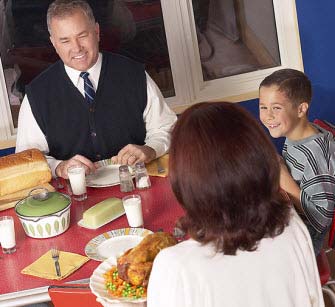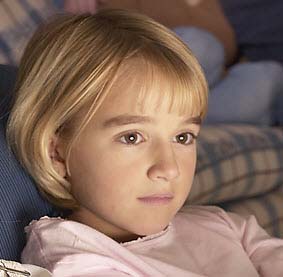- 24 -
"How to Stop Bullying" by Gail Matthews
Page 25 of 48
A small percentage may actually join in the harassment by the bully
where they also have negative views about the victim or some aspect of
their appearance, sexuality or ethnic background.
Each person probably has a way that they can rationalize their
action or lack of it. They might say:
They brought it on themselves.
I could not handle the attacker by myself.
It was not my fight.
I’m wearing new clothes.
A major influence which discourages children from assisting the
victim or becoming involved in any way (like reporting the incident) is the advice which many parents give.
They, understandably, don’t want their children to get into a
situation where they might be hurt or which might lead to retaliation by
the bully or their group at a later time. So, they tell the child not to get involved and don’t tell on anyone.
That may keep them physically safe but does nothing to reduce the
bullying problem. And, it does not protect them from the stress of
watching something which they instinctively know is wrong but which they
cannot do anything about.
Some children who witness this sort of incident at school or in their
homes can lose their sensitivity to such violence and may start to believe it is a normal way to resolve their difficulties and another bully or, at least, a supporter of bullies is created.
Copyright © 2009 All rights reserved
- 25 -

"How to Stop Bullying" by Gail Matthews
Page 26 of 48
How to Help Your Own Children
The most important thing which you can do to assist your children
is to be a role model and actively demonstrate the values which you want
them to follow in dealing with everyone that they come in contact with.
Giving Advice to
Children
Children,
like
many adults, need
direction from time to
time. But, it can be quite
difficult for us to give it in
a way that they
understand and are able
to take action about.
Children
are
always testing themselves and their boundaries as they prepare
themselves for the future in a rapidly changing World.
It may not be effective if we simply tell our children, “Do this” and
“Do that” where our advice is always in the form of blunt instructions (the way that many of our parents probably passed on their knowledge and
experience to us).
Most children who are attending school are more influenced by the
opinions and comments of their peers and classmates than they are by
advice from their parents.
Anthony Robbins, the famous motivator, pointed out that learning
something new is most effective when the new information can be relate
d
to something we already know.
To help your child understand and deal with bullying and other
concerns, you need to relate your message to something which the child
already understands. Think about passing on your advice when you can
Copyright © 2009 All rights reserved
- 26 -
"How to Stop Bullying" by Gail Matthews
Page 27 of 48
link it with something which one of their friends or someone else they
admire did instead of just telling them this is how you should behave in
this sort of situation.
Another way which can encourage children to take note of what we
say is to show a genuine interest in what they say. Don’t be too quick to judge their comments or laugh at their ideas. If your child starts a new hobby or starts trying to break a bad habit, give them support and
encouragement, especially when things aren’t working right for the .
m
Encourage them to persist but try to find a more recent role model
than that knight and the spider. When you want to discuss a difficult
subject like bullying with your child, you both might find it less stressful if you talk while you are doing some activity which you both enjoy, such as
making cookies. This can make the talk seem less formal and reduce
their stress level.
If you are looking for a reason to talk to them about bullying,
maybe you could find a report on the news or a story in a television
program which you both watch which has an element of bullying or where
one character treats another in a mean way.
You could also ask them what they think of the different styles of
jokes in different shows. Some comedians use put-downs to get a quick
laugh while others get their laughs without making the other person loo
k
silly. Perhaps you could ask them how they would prefer to be treated an
d
how they would feel if someone used a unkind joke against them. A friend
of mine said it well recently, “Don’t try to build yourself up by putting someone else down.”
Don’t try to pre end
t
that you have all the answers. If they ask you
about something and you don’t have the information, say so.
Promoting Tolerance
For all the obvious and subtle differences between us, we are all
human beings. We need to accept the differences between our cultures,
beliefs and goals. Most importantly, we should always encourage our
children to accept and welcome people that are different from them.
Copyright © 2009 All rights reserved
- 27 -

"How to Stop Bullying" by Gail Matthews
Page 28 of 48
This
won’t
happen
if we just suggest that
they let children with
different backgrounds
and appearance join
their games. It’s much
better to demonstrate
by our own actions the good manners and goodwill which we want them
to adopt.
When you are with your child and they make some remark about
someone who has a different appearance, style of clothing or whatever,
you could point out to your child that it would be a very dull World if we were all exactly the same.
Copyright © 2009 All rights reserved
- 28 -

"How to Stop Bullying" by Gail Matthews
Page 29 of 48
Signs that your Child may be a Target
As I have shown in the previous section, there are many reasons
why some children will tell their parents about being bullied while others may not.
Even parents that have developed a close bond with their children
may not find out from the child when they have been the target of a bully.
Sometimes, even the professionals can have trouble recognizing
that a child is being victimized.
You can use this list to
help you detect whether there
is a strong possibility that your
child has been bullied if you
cannot get the confirmation
from the child or other reliable
source. I have compiled this
list from what other parents
have told me and the advice of
experienced professionals. But,
it is important to keep in mind
that none of the points which I
include here are definite indicators that your child is being bullied. There may be a totally different reason why your child is showing the particular behavior or symptom.
You must use your own judgment and knowledge of your child and
never just jump to conclusions.
A child that has been bullied may:
Lose interest in visiting friends or having some friends visit them.
Have bruises, cuts or other marks which they don’t mention and are
reluctant to explain.
Claim to have lost their lunch or pocket money.
Say they damaged or lost books or other materials from their
school bag or even the bag itself.
Copyright © 2009 All rights reserved
- 29 -
"How to Stop Bullying" by Gail Matthews
Page 30 of 48
Lose their previous enthusiasm for school and after school
activities, including sport.
Claim to be sick, with vague symptoms or even real ones, more
frequently than before.
Develop rashes, cold sores or other minor infections which may be
stress related.
Refuse to go on school excursions or attend school functions.
Start getting lower grades for no apparent reason.
Be unable to sleep without nightmares, excessive sweating or other
signs of distress.
Lose their appetite or start to over indulge in snack foods.
Miss classes or stay away from school for days at a time.
Starting complaining they’re hungry as soon as they get home from
school (the bully may have stolen or thrown away the lunch you
prepared).
Spending more time alone at the computer or watching television.
Sudden change in temperament with angry outbursts and more
arguments with siblings or parents.
Make repeated demands for more fashionable clothes and other
accessories which are popular with the children at their school.
If you see any of the indicators that I have listed above, your child
will offer an explanation for it. You may believe that they are hiding the truth from you, but that could just be out of genuine concern, because
they don’t want to worry you or they think you might be disappointed in
them if they tell you that they have been bullied.
It is best to develop a habit of chatting with your children and
displaying a genuine interest in their experiences at school over time
rather than only showing an interest when they are showing signs like
those listed above. But, they will expect you to ask and you should be as tactful as you can how you discuss this or other personal subjects with
them.
Copyright © 2009 All rights reserved
- 30 -
"How to Stop Bullying" by Gail Matthews
Page 31 of 48
When Your Child has been Bullied
If you hear from a reliable third party about your child being bullied
or if you are convinced that it is happening because of the changes in
behavior and temperament that you have seen, approach the matter
calmly and avoid dramatic questions or accusations.
Dealing with the Bully and their Parents
Most parents will naturally be upset when they know that their child
has been bullied. Sit down with your child and get their version of the
incident or incidents. It’s a good idea to write everything down and keep a record of all matters that relate to the bullying and your follow-up until the matter is resolved.
If you find out the name of the child that your child tells you are the
bully, you may want to confront the child or group that targeted their child directly and as soon as possible.
This is an understandable reaction but it is unlikely to produce a
positive result. In that sort of situation, you should always make sure that you cannot be accused of applying any sort of pressure on any child.
You must treat them as you would expect your own child to be
treated if the roles were reversed. Only meet the child if the meeting has been set and you know that a neutral adult, such as a teacher, is also
present. If you know or find out the names and address of the bully’s
parents, you may try to meet them and discuss the issue.
Let me warn you that this can often lead to confrontation between
yourself and the other parents. This can have a serious and long-lasting
effect on any bond or relationship which your family has enjoyed with
them in the past. Keep that possibility in mind.
But, of course, your main focus will be to find out what actually
occurred and to stop your child being bullied as quickly as possible to limit the possibility of any long-term harm.
The other child’s parents are likely to have a totally different view of
the situation. Their child may have told them that the children were just playing a game or even that your child was the aggressor!
Copyright © 2009 All rights reserved
- 31 -
"How to Stop Bullying" by Gail Matthews
Page 32 of 48
To give yourself the best chance to resolve the situation, approach
them in a calm and co-operative manner. Ask for their help in solving your mutual problem rather than demanding that their child be punished.
Make sure that you write down your recollection of everything that
was said at the meeting with the parents, if you have one, before you
forget anything. I believe that it’s a better choice for you to contact the school and let them follow up with the other family. I’ll cover that and
some other suggestions in the next chapter.
Copyright © 2009 All rights reserved
- 32 -
"How to Stop Bullying" by Gail Matthews
Page 33 of 48
Dealing with Your Child’s School
All schools in each country face growing demands and shrinking
resources. The basic demands are that they provide a safe and
supportive environment where the students can increase their knowledge
and learn to make the best of their abilities.
Schools also provide a great opportunity for children to develop
their social skills and forge friendships which may last the rest of their lives. Schools also often encourage, unintentionally, bullying of the weak by the strong. This mostly happens between students but there are also
many incidents where teachers or other staff bully each other or some of
the students.
There must be a good level of supervision in a school or bullying
could flourish. The best schools will support their students and their
teachers and other staff. They will treat all with equal respect and provide good systems and role models. Some schools boast that they don’t have
any bullying but that always makes me wonder.
When your child has been bullied and you want it stopped, I believe
that the best course would be to report the matter to your child's school principal and also contact their home room teacher. They are likely to
have some experience of similar situations and know more about the
activities and alliances of all the children involved than you do.
The school will also have access to professional help if it should be
required. So, give them all the details you have and ask them to follow it up. If you don’t get any satisfactory response, you should contact other parents that are not involved in the incident and the parent’s group, if the school has one, to find out if there is a history of bullying and get their suggestions about obtaining a positive result.
After about a week, contact the school and arrange to meet the
home room teacher, a senior teacher (preferably the principal) and their
human resources person if the school has one. Let your child attend the
meeting if they want to. Don’t push them to do so.
But, either way, make sure that you take your written record of the
incident and the follow-up to the meeting with the teachers.
Copyright © 2009 All rights reserved
- 33 -
"How to Stop Bullying" by Gail Matthews
Page 34 of 48
Do as I suggested earlier for your discussion with the other child’s
parents. Calmly state the facts as you know them and ask for their help
to resolve the matter. Do not blame anyone and don’t make threats. You
want their cooperation because they have more knowledge than you
about the legal and education systems and are more likely to help you if
you maintain a professional attitude.
Make notes about everything that is said and who said it. Ask any
questions that come to mind, such as the level of supervision during
classes and, breaks as well as before and after school. Try to get
information about other bullying incidents and how they were resolved.
After the meeting, carefully prepare a letter with all the facts, your
recollection of the discussion and what you believe has been agreed as the next step.
If you do not see any progress with the school after a week or so,
contact them by phone and ask for an update in writing. Contact other
parents to check whether there are any other recent bullying episodes at
the school.
If these are also unresolved, you may be able to get the other
parents to join you in an approach to the School Board or the relevant
public official if it is a public school. Ensure that you keep a record of any further incidents involving your child while you try to get action from the school. It may be time-consuming and frustrating but this method should
get you results.
It is a good demonstration to your child of following proper process
and shows that they have your support and you will take whatever action
you need to help them.
Copyright © 2009 All rights reserved
- 34 -

"How to Stop Bullying" by Gail Matthews
Page 35 of 48
When Your Child tells You about Bullying
Many
children
will not feel confident
enough to tell an adult,
either a parent or
teacher or other
authority figure, that
they have been bullied.
They may have learned
from other children as
well as their parents
that it is wrong to tell
tales.
We need to assure them that telling a responsible adult about a
potentially harmful situation which affects them or other children is always the right thing to do.
Research suggests that most children will tell someone about
bullying which they have been subjected to.
This will usually be another child, less often a parent (most often
their mother) and even less often a teacher or other person in a position of authority.
Boys are usually less likely to tell someone. Perhaps because they
are conditioned by society and the books and movies they see to believe
that they should try to handle those sorts of problems themselves.
If your child does tell you that they have been bullied, it is a sign
that your relationship with the child is a strong one. Your first reaction is very important.
Even an incident which you might feel is minor can be distressful for
a young child. It will influence how the child deals with future incidents and also how confident they will feel about seeking support from you or
other adults in the future.
Show that you care about how they feel and that you will help them
through the situation. Some people will tell their children to ignore the Copyright © 2009 All rights reserved
- 35 -
"How to Stop Bullying" by Gail Matthews
Page 36 of 48
incident if it seems to be minor or if they think it may not be repeated.
This can suggest to the child that their concerns and the physical or
emotional hurt they suffered is not as important to you as they feel it is.
It could make them keep quiet about any further incidents.
This could have a lasting impact as bottling up their feelings about
the bullying along with your lack of effective response might increase their emotional stress.
That could lead to the development of physical or emotional
ailments later on or it may lead them to bully other children, even their younger siblings.
Don’t just tell the child what they should do without showing by
word and action that you understand on an emotional level what they are
going through and that they can depend on your support as well as your
advice.
Why Children Don’t tell Adults about Bullying
Several factors can cause a child to not report bullying which they
are subjected to.
The aggressor will usually threaten them to not tell anyone.
The child may not feel that adults, whether their family or teachers
or other authority figures, will take them seriously or be able to
provide effective support.
A child may not have any close friends among the other children.
The child may fear the reaction of other children when they learn
about them reporting the bullying.
The victim may know of other students who have reported the
attacks on them and either not been believed or failed to gain any
help to resolve the problem.
Sometimes, the victim has reported that things got worse after they
reported the first incident!
Research suggests that nobody; teachers or any other group, were
more than 50% successful in stopping the bullying.
Copyright © 2009 All rights reserved
- 36 -
"How to Stop Bullying" by Gail Matthews
Page 37 of 48
If those figures reflect the current situation, we need to improve the
way that reports are followed up so that better outcomes become the
norm rather than the exception.
Copyright © 2009 All rights reserved
- 37 -

"How to Stop Bullying" by Gail Matthews
Page 38 of 48
Helping Your Child to Handle Bullies.
You can help your child to be prepared for bullies as it is inevitable
they will encounter one or more in each of the
schools which they attend. I feel the most
important thing you need to tell your child is that
you will be ready to support them with any
problems that they encounter at school or
elsewhere.
You can also help them to develop their
social skills, self-confidence and a network of
friends – three important fa








